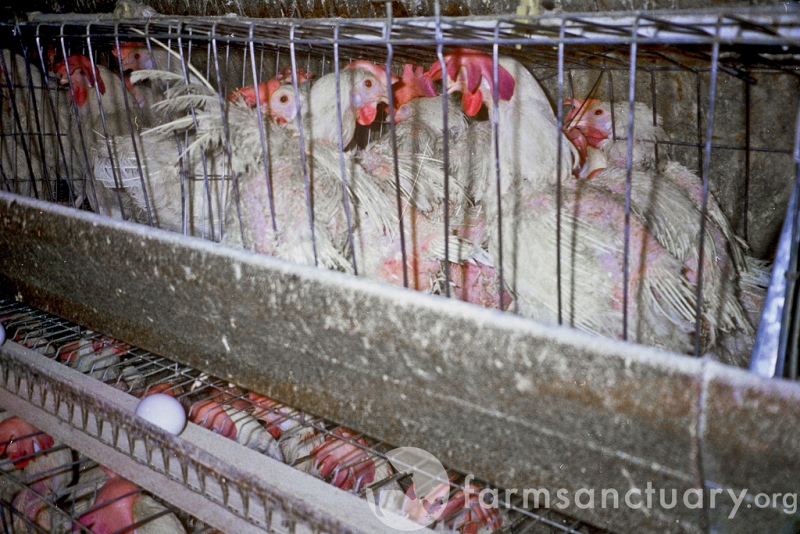Typically, female chickens live their lives in tiny battery cages, crammed in with up to six other hens—cages so small that they can’t even spread their wings. As a direct result of this restriction and the lack of ability to engage in the normal and natural daily activities of a hen, cannibalism is a common occurrence.
In fact, this cannibalism is so common that most factory farms resort to removing up to 2/3 of the hens’ beaks in a process called “debeaking,” in order to reduce these cannibalistic tendencies.
Hens in nature can live up to twenty years—but egg-laying hens are slaughtered after about two years, when their egg-laying capability is exhausted. They spend only a few short, miserable years on this earth. Their emaciated bodies are considered too emaciated to be eaten, so they are used in pet food.
Now what if they’re cage-free? What if they’re from free-range hens?
Well, the USDA has no specifications regarding cage-free eggs. So these eggs usually come from hens that, instead of being packed into tiny cages with five other hens, are crammed into one giant warehouse. This means greatly reduced air quality, and the hens often kill each other, as studies show that this is the most common cause of death on cage-free poultry farms.
What’s more: hens on cage-free poultry farms are still debeaked (an inhumane and immoral practice, no matter which way you spin it), they are often kept in filthy conditions, they still may never see the sun or feel the grass underneath their feet, and they are still sent to the slaughterhouse when they can no longer produce eggs.
Furthermore: according to USDA requirements, if a producer wants to smack a “free-range” label onto their eggs, they need only “demonstrate to the Agency that the poultry has been allowed access to the outside.” So nope, get rid of whatever image you have in your head of hens roaming around in an open pasture with sunlight and fresh air.
The requirement is only that they have access to the outdoors. The USDA does not define a specific amount of time during which the hens must be outside (so, in fact, your free-range hen may have never seen the sun), nor does it define any standard of quality or cleanliness that this outdoor area must meet. It could be as small as a covered porch or patio, and it could be covered in feces.
They are still debeaked, they may still be kept kept in filthy conditions, they may never see the sun or feel the grass underneath their feet, and they are still sent to the slaughterhouse when they can no longer produce eggs.
In the end, free-range poultry facilities are virtually no different than cage free poultry facilities.
And finally, organic eggs simply come from chickens that are fed an organic vegetarian diet—while it is also worth noting that a chicken’s natural diet is not strictly vegetarian.
Whether your eggs are all of the industries mentioned, you are still supporting the gruesome murder of approximately 200,000,000 male chicks a year. Many of them are simply thrown into a dumpster and left to die, but most frequently, they are dumped into meat grinders and ground up alive.
I’m not making this stuff up. It is real, it is happening, and it has been thoroughly documented.
The male chicks are not killed for their meat, because raising these chicks is too expensive; the cost of the food, water, and shelter required to raise a male chick would often outweigh the profit of the meat. In addition, the USDA does not allow the use of hormones or chemicals in raising poultry; and male chickens don’t grow as big or as fast as female chickens, and their meat tends to be too tough to eat. So, in the end, it’s more profitable to kill them—to simply eliminate them from the equation.
When you buy eggs, you are supporting this:
All the nice-sounding labels are just smart marketing, and they play on our desire to remain ignorant. They are designed to make you feel less guilty, but cruelty is still cruelty.
“When you’re in the supermarket, you don’t want to think about where those products are coming from, you don’t want to think about how those animals are being reared, or how they’re being treated. The power of willful ignorance cannot be overstated. This is systemized cruelty on a massive scale, and we only get away with it because everyone is prepared to look the other way.” –The Secrets of Food Marketing
So now… what about eating eggs from backyard chickens?
Well first of all, in nature, chickens will eat their own unfertilized eggs. The act of laying an egg is tremendously exhausting, and drains countless vital nutrients from a hen’s body, and her eating those eggs is a natural way for her to replenish the vitamins and nutrients that were lost. So when you take a hen’s eggs, you are taking those vitamins and nutrients from her. You are taking them at her expense. Furthermore, you have no justified claim to the product of her work. Because, yes, just like childbirth, laying an egg is hard fucking work.
And finally, let me ask you this: You do not expect your cat or dog to give you anything in return for living with you (besides company and peaceful coexistence), do you? Why do you expect only backyard chickens and cows to pay for a membership in your family?

